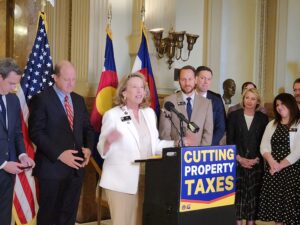A bill to offer a $1.3 billion property-tax cut completed a whirlwind ride through the Legislature on the final day of the 2024 session Wednesday, preparing it to be signed quickly by Gov. Jared Polis.
Though Senate Bill 233 was introduced only Monday, it is the culmination of work that began three-and-a-half years ago when voters repealed the Gallagher Amendment that had regulated property-tax assessment rates and burdened businesses disproportionately. It relied heavily on the work of the Commission on Property Tax created by legislators during a November special session after voters rejected Proposition HH, whose enabling legislation also passed at the end of the 2023 session.
While that 2023 bill was wildly controversial and sparked a walkout by House Republicans when their ability to debate it and a sister measure was limited on the final day of last year’s session, SB 233 was different, drawing wide praise and bipartisan support. It passed the House by a final margin of 57-6 and the Senate by a vote of 33-2, receiving opposition only from an octet of conservative Republicans who complained that it didn’t go far enough.
“A permanent path forward”
Sen. Barbara Kirkmeyer, the Brighton Republican who worked long hours over the past week with cosponsoring Democratic Sen. Hansen of Denver to craft the bill, said the wide range of input to SB 233 marks it as different legislation than was seen last year. Other key differences are the size of the breaks going to commercial property owners and homeowners and the fact that unlike the temporary property tax breaks the Legislature has granted recently, these changes won’t go away after one year.
“This offers significant property tax relief,” Kirkmeyer told the Senate. “We now have a package that provides a permanent path forward.”

Colorado state Sen. Barbara Kirkmeyer stumps for her property-tax bill in the Senate Wednesday.
SB 233 establishes a 5.5% annual cap on the increase in statewide property-tax revenues — a provision that seeks to prevent the fiscal shocks that greeted state residents who saw property valuations rise by an average of more than 40% last year. But it also decouples assessments for school districts and for all other governments, so that cities and counties choosing to offer property-tax relief can do so without cutting into educational budgets.
It establishes a 6.7% local-government assessment rate on residential property this year and a 6.4% rate next year before permanently putting in place a 6.95% rate in 2026 that will be calculated only after homeowners subtract 10% of their home value, up to $70,000. That percentage subtraction allows for more progressive tax policy that will benefit owners of lower-cost homes more than those of high-dollar houses, Hansen emphasized.
The addition of decoupling
Residential assessment rates for school districts will return next year to 7.15%, but a formula in the bill requires that once they generate enough money to ensure that local taxes cover 60% of school-district budgets, those assessment rates will come down. Most school districts receive the majority of their funding from the state government because of a formula in the Gallagher Amendment that forced down assessment rates on homes as overall property-tax revenues rose, but the new formula should change that.
Combining the new residential rates with the exemption of as much as $70,000 establishes effective residential assessment rates of 6.3% for homes of $600,000 or less and 6.6% rates when combined with the new, higher school-district assessment rates, according to a summary done by the Bell Policy Center. For $1 million homes, those effective assessment rates then become 6.5% for the non-school parts of their bills and 6.7% with school assessment rates included.
SB 233, meanwhile, will reduce the 27.9% assessment rate on nonresidential property to 27% next year and a permanent level of 25% in 2026. Colorado Chamber of Commerce President/CEO Loren Furman told the House Appropriations Committee on Tuesday that with studies showing Colorado an increasingly expensive state to do business, reducing the cost of living is a strategic goal for her and other leaders.
“I will tell you that this bill meets that goal,” said Furman, a member of the special property-tax commission who was active in the bill negotiations. “It’s reducing the residential property rates; it’s reducing the nonresidential property rates; and creating a stable and predictable property tax system.”

Loren Furman is president and CEO of the Colorado Chamber of Commerce.
Amendments to property-tax plan
SB 233 underwent several changes in the House over the past two days.
Cosponsoring Reps. Chris deGruy Kennedy of Lakewood and Lisa Frizell of Castle Rock clarified that while home-rule cities must be exempted from the 5.5% revenue-increase cap, home-rule counties are not. They allowed agricultural-land rates to decrease at the same pace as commercial property rates. And they dropped the residential local-government rate next year from 6.7% to 6.4%.
They also added a provision that prevents the bill from being enacted if either of two initiatives from Advance Colorado and Colorado Concern make it onto the November ballot and pass. Initiative 50 would set a hard 4% cap on property-tax revenue increases and Initiative 108 would lower assessment rates to 5.7% for residential property and 24% for commercial property. Advance Colorado President Michael Fields has said the breaks in SB 233 aren’t significant enough to stop him from moving forward with his effort.
Frizell told House members on Wednesday that SB 233 is needed to stop those initiatives from passing because they would be a “catastrophe” for state and local governments, requiring backfill levels of several billion dollars and diverting money from infrastructure. While some Republicans have asked Frizell why she won’t just support those ballot initiatives, she explained that the state needs to help homeowners and businesses but also needs to provide necessary services.
“A list of Band-aids”?
“By virtue of our seats in this building, we have the responsibility to look at policy through a unique lens. We don’t have the luxury to just throw numbers on a piece of paper and think it’s going to work out,” Frizell said. “If the voters of Colorado decide they want another policy, we have to honor that. But right now, today, this is solid policy.”

Sen. Lisa Frizell speaks at a Capitol news conference Monday announcing the property-tax bill.
SB 233 will function as the permanent replacement for Gallagher, a 1982 constitutional amendment that mandated 55% of the property tax revenue that helps to fund schools and local governments came from businesses while just 45% came from homes. Voters nixed that law as nonresidential assessment rates grew to four times residential rates and home-heavy rural counties struggled to maintain revenue bases, but it wasn’t until the creation of the property-tax commission that a long-term alternative sprouted legs.
Conservatives who voted against SB 233 felt it could have gone further. Colorado Springs Republican Rep. Scott Bottoms said even more relief would be available if the state cut unnecessary spending throughout its budget. GOP Sen. Mark Baisley said local governments need to figure out necessary spending and then receive tax revenues to fund services rather than determining how much revenue they’ll get and growing their budget to use it.
“It is a list of Band-aids and a splint or two and an antibiotic, but it does not cure the disease itself,” Baisley, who was a member of the property-tax commission, said Tuesday of SB 233. “I’m very disappointed that the task force did not take on the big problem of finding a permanent fix.”
Republicans defend property-tax bill
Kirkmeyer rebutted that assertion during Senate debate by noting that the solution very much is permanent, as the assessment rates that are going down because of SB 233 can’t go back up without voter approval.
Some more liberal legislators also questioned the specifics of SB 233, and Bell Policy Center President Scott Wasserman told the House Appropriations Committee that he wished there was some relief in the bill specifically marked for renters. But no Democrats ended up voting against the bill.

Colorado House Minority Leader Rose Pugliese speaks at a news conference Monday on the property-tax bill.
House Minority Leader Rose Pugliese contrasted Wednesday’s end to the 2024 legislative session to the acrimony of 2023, when Republicans charged Democrats with railroading one-sided policy and then helped to defeat it at the ballot. Pugliese, who was involved with negotiations on SB 233, said the ideas in the bill came from talks with voters, the research of the property-tax commission and efforts to reach across the aisle, and its final passage just 17 minutes before the House adjourned was earned.
“I feel like we were here once before. However, this bill is different … It feels like it came overnight, but it really didn’t,” she said Wednesday. “Whenever we’re doing big policies, there’s never enough time. But we have spent over a year now working to get to this point.”
